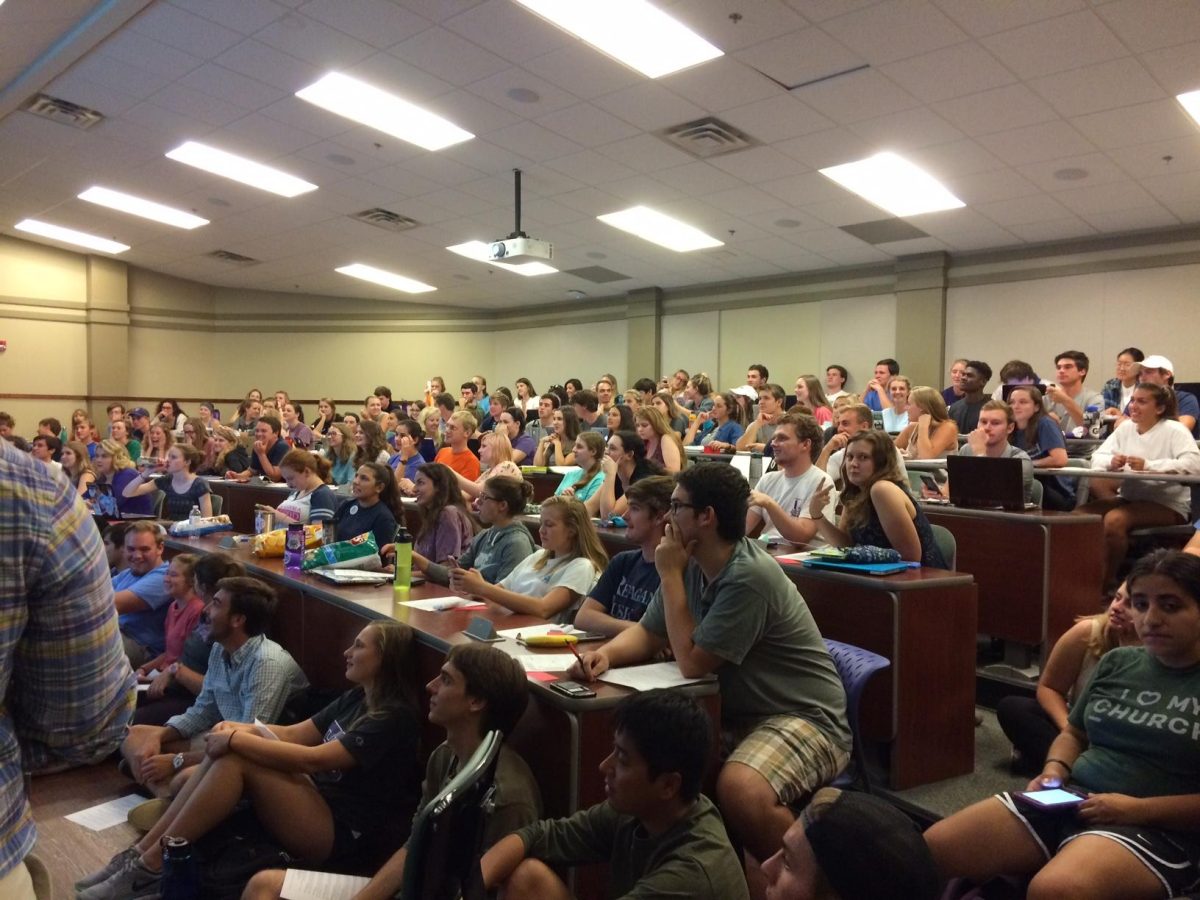

Furman students watched the first presidential debate of 2016 on Sept. 26. Students in the crowd also analyzed the debate in a CLP event. Photo courtesy Amanda Richey.
As a foreign student, I have personally never known of a country that is as politically divisive as the United States, a country in which two national parties have been socially accepted as umbrella terms for certain states, cultures, ethnicities and individual identities. I have also never been in another country where labeling and generalizing were a natural part of the mainstream political discourse. This political dichotomy has caused many to find comfort in the binary like it is a permanent condition. It is almost like many people are using red to color in a drawing of a dove just because it has always been — and they think it always will be — their favorite color. This is a toxic mentality; more holistic and nuanced judgments need to be made when electing the next president of a country as globally influential as the U.S.
While my perspective of the presidential candidates stems from my experience of viewing them overseas, I think it is important that American citizens be aware of the global impact that they will have. Watching “The Apprentice” as a child in Ghana was how I learned just who Donald Trump was: a wealthy, rude, powerful and insensitive man that made the expression “You’re fired!” notorious. Little did I know that the show reflected much of his formal behavior and that he would some day run for the presidency. His irrational behavior and insensitive temperament alone is enough to anger foreign leaders since it insults the different non-Western respectful politics that exist.
Hillary Clinton is a common name in circles of international discourse due to the fact that she has established strong relations with many of our global leaders. Americans must try to understand our existing familiarity with her as foreigners, and the common perception of her globally as a strong woman who has connected with us in a civil and respectful manner. However, I cannot say that I am overly familiar with her domestic work, and therefore I cannot speak for her as a national leader. But I, as well as many other foreigners, can definitely speak for her as an international leader due to her experience and acumen concerning contemporary international affairs.
Trump has never been a political servant and the overseas expansion of his hotel enterprise (along with his work as a global TV personality) are the only experience he has in international affairs. Despite this, he feels the need to devise foreign policies that drastically limit immigration to the US and wishes to ban a whole religious population from entering the country. I am curious to know what a Muslim ban looks like, and how he would go about immobilizing the influx of something so intangible and independent from race as religious background. How can a citizen of this world actually entertain such exclusionary rhetoric?
As a foreigner on temporary stay in the U.S. witnessing growing support for his policies, I honestly cannot help but also ask the following: “Will I be interrogated?”
This is a question running constantly through the minds of many international students here at Furman, especially those coming from predominantly Islamic countries. It is crazy to think that this might be their last year at Furman, if Trump were to become president and actually enact the policies he currently endorses.
As Hillary said during the debate, “People around the world follow our presidential campaigns so closely, trying to get hints about what [the U.S.] will do.” The US is a global superpower with a hegemonic influence on the political, economic, cultural and military conditions of many countries. Simply put, this year’s election results will have repercussions everywhere.
I believe that fear influences a large portion of the modern American outlook on both domestic and international activities. This of course stems from historical instances where the country has dealt with local instability and extreme international opposition. However, fear can lead to irrational decisions. As a person that cannot obtain a local ballot, I can only hope that my peers think about the international community, and most importantly, those on campus who now fear too, when casting their votes.